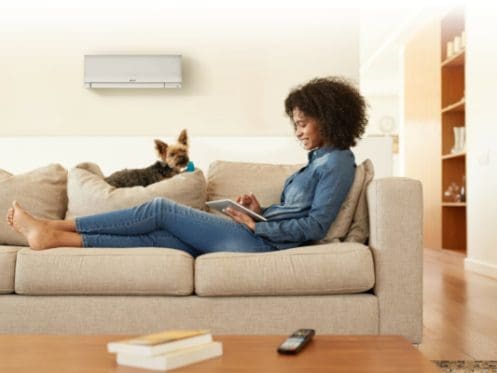Is a Ductless Mini-Split Heat Pump an Effective Whole-House Heating Solution?
Many older homes in Metuchen, New Jersey were built without HVAC ductwork. Residents often rely on baseboard heaters and window air conditioners for indoor temperature control. With ductless mini-splits providing reliable, whole-house heating and cooling in temperate climates, consumers are quickly realizing that there’s a more cost-effective and convenient way to maintain comfortable living conditions. However, given that ductless mini splits use heat transfer rather than actually producing heated air, they aren’t the ideal heating solution for every location. When outside temperatures are too cold, ductless heat pumps face the challenge of not having adequate heat to move indoors.
What Is a Ductless Mini Split?
Ductless mini-split heat pumps are combination heating and cooling systems that don’t require HVAC ductwork. Much like air conditioners, heat pumps don’t actually produce heated or cooled air. Instead, they use heat transfer to create the ideal indoor temperatures year-round. In summer, ductless heat pumps remove hot indoor air and deposit it outside. In winter, these same units work in reverse to extract heat from the outside air and move it indoors. Even when outdoor temperatures are as low as 40 degrees Fahrenheit, they can still serve as suitable sources of heating.
With a ductless mini-split heat pump, a single outdoor unit can accommodate a limited number of indoor air handlers. Each room or zone that needs service throughout the building has its own air handler and thermostat. Best of all, each thermostat can be adjusted independently of the others. Thus, if you want heating in one area of your home but don’t want to waste energy raising the temperature in areas that aren’t occupied, you can turn the heat on where you are and leave all other air handlers off.
What Are the Benefits of Having a Ductless Mini Split?
Ductless mini-split heat pumps are among the most efficient and environmentally friendly heating solutions that consumers can choose. These units produce zero carbon emissions during operation. Rather than using heating oil or natural gas, they use modest amounts of electricity to transfer existing heat from one area to another. For homeowners who are looking for an easy way to lower their carbon footprints, ductless mini-split systems are often the best answer.
Zoned heating and cooling save a tremendous amount of energy by making it unnecessary to heat or cool unoccupied spaces. However, this level of flexibility also has benefits in terms of comfort. Whereas central HVAC systems are designed to heat and cool homes uniformly, homes that have ductless mini splits can have customized temperatures throughout. For instance, warm-blooded people who are always hot can escape to areas of the building that aren’t receiving a constant supply of heat. Likewise, those who are always chilly can turn their air handlers on and adjust their individual thermostats to suit their preferences.
Another major benefit of ductless mini splits lies in the fact that they don’t require HVAC air ducts. This allows for significantly higher indoor air quality by eliminating the dirt, dust, pollen, and other debris that often gets picked up and circulated through ductwork. In fact, having a system that doesn’t use ducting additionally eliminates one of the biggest causes of energy loss which is leaky or damaged ductwork. It also eliminates the added costs of ongoing duct maintenance. However, be sure to clean the heat pump’s indoor filters on a regular basis.
Finally, there’s the fact that ductless mini-split heat pumps double as air conditioners. During summer, you can use the same unit that you used to heat your home in winter to keep it cool when outside temperatures soar.
Are There Limitations?
So far, ductless mini-split heat pumps probably sound ideal. Unfortunately, these systems do have major limitations. To start, if you happen to live in an extremely cold climate, a ductless heat pump won’t be able to reliably meet your home heating needs when the outdoor temperatures plummet. Although these systems can extract heat from outdoors and transfer it inside when temperatures fall as low as 40 degrees, they aren’t much use when outside temperatures fall any lower. In Metuchen, winter temperatures often fall below freezing. In fact, freezing temperatures can persist for months. If you have a heat pump as your sole source of heating, this unit will run constantly, and it will still fail to create a comfortable building interior.
The energy-saving benefits of having a heat pump also greatly decline in colder regions. A struggling heat pump will use far more electricity to barely heat a home than an electric boiler or furnace will.
How Many Zones Can a Ductless Mini-Split System Have?
A single ductless heat pump can service as many as eight different zones. With just one outdoor unit, you can have eight air handlers and eight different thermostats strategically placed throughout your living environment. In most houses, this can mean having a separate air handler in every bedroom as well as air handlers in the living room, den, and other common areas.
Is a Ductless Mini Split Right for Your Home?
Ductless mini-split heat pumps are hardly the ideal whole-house heating solution for residents of New Jersey. Wintertime temperatures are simply too cold to make these a reliable source of heating. Without another heating solution to fall back on, the interior of your home could become dangerously cold. Using a heat pump in a climate like Metuchen’s will also place undue wear on this system. Heat pumps that are consistently overworked have more problems, and they typically have shorter lifespans as well.
However, there are uses for ductless mini-split heat pumps in New Jersey. After all, these units are just as efficient when used as air conditioners as they are when used as heaters in more temperate climates. Thus, if you’ve got a primary heating system that you’re more than happy with but have been relying on window air conditioners for cooling, having a ductless heat pump installed may be the way to go. You can also use this same unit to warm the interior of your home on a crisp autumn day as long as the outside temperatures don’t drop too low.
Ductless heat pumps are effective for heating and cooling areas of the home that aren’t already serviced by a central HVAC system. For instance, if you’ve recently built a new home addition, you may find that it’s more cost-effective to add a ductless mini split to this unserviced area than it is to extend your existing ductwork. Ductless heat pumps also work well for garages, basements, attics, and workshops. In smaller spaces like these, heat pumps can remain effective sources of heat at fairly low temperatures as long as strategic insulating and weatherproofing methods have been employed.
If you’re looking for an efficient and cost-effective way to heat your home in a cold-weather climate, you’ll likely get the best results from a high-efficiency heater or boiler. These systems remain reliable even when outside temperatures fall well below freezing.
First Choice Plumbing, Heating & Air Conditioning proudly serves residents of Metuchen, New Jersey and the surrounding area. We provide residential and commercial heating, cooling, and plumbing installation, maintenance, and repair services. We also offer indoor air quality services and oil-to-gas conversions. If you want to find out more about using a ductless mini split in your home, give First Choice Plumbing, Heating & Air Conditioning a call today.



